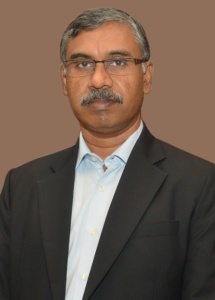- September 30, 2014
- Posted by: kunalsabnis
- Category:BLOG, In Conversation With
 Vidhu Shekhar, CFA an equity market expert who began his career as a software engineer, is a man of many talents. An IIM Ahmedabad alumnus, Vidhu is today the country head of CFA Institute in India. In between he worked in technology roles at securities firms in Hong Kong before coming back to India head ETrade Systems and then Joining IDBI Capital Markets as Head of Equity in 2001. Vidhu moved to National Stock Exchange in 2005, working on product development. He was also part of the committee on corporate debt and the Raghuram Rajan committee on financial sector. Here he talks about how CFA aspirants should approach the work and what lies in store for them.
Vidhu Shekhar, CFA an equity market expert who began his career as a software engineer, is a man of many talents. An IIM Ahmedabad alumnus, Vidhu is today the country head of CFA Institute in India. In between he worked in technology roles at securities firms in Hong Kong before coming back to India head ETrade Systems and then Joining IDBI Capital Markets as Head of Equity in 2001. Vidhu moved to National Stock Exchange in 2005, working on product development. He was also part of the committee on corporate debt and the Raghuram Rajan committee on financial sector. Here he talks about how CFA aspirants should approach the work and what lies in store for them.
How do you view the Finance/Investment management industry with regards to scope, growth and job prospects? How can CFA charter holders take advantage of it?
Ours is a cyclical business. In the last few years, we have gone through a period of rapid growth in the industry followed by a long period when all sections of the investment management business have shrunk. We seem to be back in a growth phase right now. With the right tailwinds, we can expect to see better career prospects for CFA candidates and charter holders.
At CFA Institute we have recently enhanced our focus on creating multi-faceted partnerships with institutions. In India, the typical charter holder or candidate has less experience compared to their peers in US and Europe, and need to develop a number of skills in order to improve their career prospects. The ability to pass the CFA exams is a great demonstration of your perseverance and capability, but it is not enough. My advice to young charter holders would be to focus their efforts on improving their knowledge and skills in their chosen area of work. At the same time, they should build upon the knowledge they gained as part of the CFA program in order to develop a broad understanding of the economy and the issues that impact investment performance. Communication skills are also an important part of your repertoire. Success will come when you are able to combine your professional knowledge with your ability to influence the people around you.
How did CFA help in enhancing your career objectives?
For me, taking the CFA exam was a logical outcome of my desire to understand the industry I was working in. I was in Hong Kong during the East Asian crisis of 1997, and had a ring side view of events like the attack on the Hong Kong peg and the collapse of the Indonesian Rupiah. It was at that time that I saw a brochure from the Hong Kong Society of Financial Analysts (HKSFA) that someone had left in my office. I didn’t do CFA with a view to career improvement. However, it did enable me to get a much better understanding of the world I lived in, and eventually contributed to my personal and career growth.
How would you rate the CFA course with respect to content and structure including the pros and cons? Also include aspects which give CFA course an edge over other courses.
There are many wonderful aspects of the CFA course. I will highlight two – i) the CBOK is very comprehensive and is constantly updated through practice analysis, hence the CFA program teaches you what people are practicing in the field, and ii) it gives you a very practical orientation on practice of ethics in investment management. This is something very few other courses do. The quality of materials is wonderful and it is a joy to read study.
The one thing I don’t like is that many candidates these days do not have the time and inclination to actually master the course contents but rely on short cuts provided by coaching centres and prep providers. By doing this, they miss out on the opportunity to learn what they are meant to learn.
What guidance you would give to CFA aspirants?
To succeed in the exams – before you register, decide whether you are really interested in a career in investment management and ready for the effort required. It takes a lot of time and commitment to pass the exams and you should remember that there are no shortcuts
Start thinking about your specific career plan by the time you are preparing for Level 2. Find some mentors who can help you.
Join IAIP and start networking; become a volunteer. It will help you get a much better understanding of the challenges involved and how to meet them.
Points noted above are personal views and not made on behalf of the employer organisation or on behalf of IAIP.
A part of Newsletter – Sep 2014
